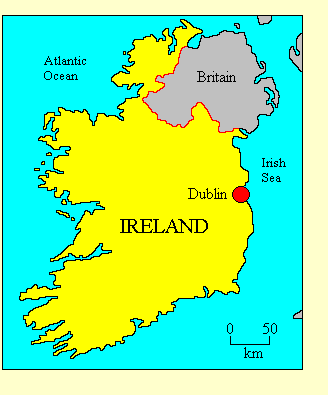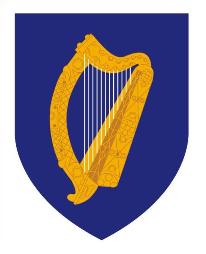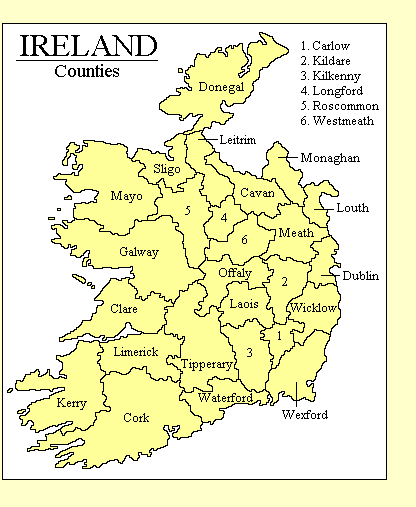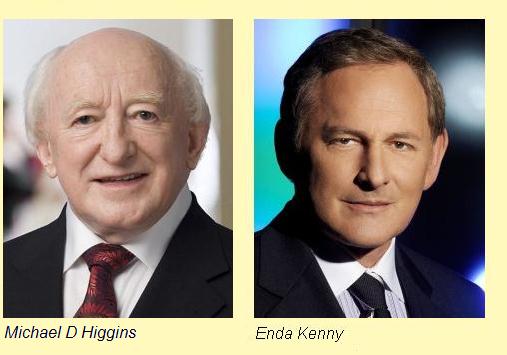

IRELAND
• Official name: Eire / Ireland (The country is often referred to as the Republic of
Ireland or the Irish Republic (Poblacht na hEireann) to distinguish it from the geographic
term "Ireland," which includes the British territory of Northern Ireland.)
• Location: Western Europe
• International organisations: Council of Europe, European Union, Organisation for Economic Co-operation
and Development, Organisation for Security and Co-operation in Europe, United Nations, World Trade Organisation.
• Borders: Britain
• Coastline: Atlantic Ocean, Irish Sea
• Land area: 70,280 Km2
• Population: 4,500,000
• Annual GDP (PPP) per capita: US$42,200 (2009 CIA estimate). World ranking: 10
• Ethnicity: Virtually the whole population identifies as Irish.
Historically, the population is a mix of Celtic, Anglo-Saxon, Norman and Scandinavian. There
are small Asian and Afro-Caribbean minorities.
• Languages: Irish and English are official languages. English is almost universally
understood and is the language of government, business and communications. About 10% of the
population claim to speak Irish as their first language, but this is
certainly an exaggeration.

• Religion: Over 90% of the population are at least nominally
Catholic Christians. Once the most observant Catholic country in
Europe, Ireland has become increasingly secular. Catholicism cesed to be the state
religion in 1973. There are small
minorities of various Protestant Christian denominations.
• Form of government: Parliamentary democratic republic.
Ireland is divided into 26 counties.
• Capital: Dublin (officially called Baile Atha Cliath)
• Constitution: The
Constitution of Ireland came into effect on 29 December 1937.
• Head of state: The President, elected by direct universal suffrage for a
seven-year term. The President's functions are largely ceremionial. President
Michael D Higgins took office on 11 November 2011.
• Head of government: The Prime Minister (commonly called by the Irish title Taoiseach,
pronounced Tee-shock),
appointed by the President. The
Prime Minister is the leader of the largest party in the legislature and
is accountable to it.
• Legislature: Ireland has a bicameral legislature, the
Parliament / Oireachtas. The Irish House
of Representatives / Dail Eireann has 166 members elected for five-year terms by
proportional representation from multi-member constituencies. The Senate of
Ireland / Seanad Eireann has 60 members. Of these, 43 are elected from panels of
candidates representing specified vocational interests, 11 are nominated by the Prime
Minister and six are elected by university graduates.
• Electoral authority: The
Department
of the Environment, Heritage and Local Government administers national elections, but the
best source of Irish election results is Irish Elections.
• Freedom House 2011 rating: Political Rights 1, Civil Liberties 1
• Transparency International Corruption Index: 92% (14 of 178 countries rated)
• Reporters Without Borders Press Freedom 2010 Index: 98% (9 of 178 countries rated)
• Heritage Foundation Economic Freedom 2010 Index: 78.7% (7 of 179 countries rated)
Political history
English penetration of Celtic Ireland began in the 12th century, although English
rule over most of Ireland was not established until Tudor times. An Irish Parliament
was established in 1295. After the Protestant Reformation Ireland became in effect an
English colony, with an elite of English and Scottish Protestant landowners ruling
over the Celtic Catholic majority. Despite many rebellions, the Irish were unable to
challenge English rule. In 1801 the Irish Parliament was abolished and Ireland was
formally incorporated into the United Kingdom.

The admission of Catholics to the British Parliament in 1829 and the expansion
of the franchise in 1885 allowed the formation of an Irish Nationalist Party, which
campaigned unsuccessfully for "home rule" for Ireland. This was resisted by the
Protestant majority in the six northern counties. In 1916 a nationalist rebellion
broke out in Dublin, which although suppressed sparked a national rising. After a bitter
civil war, independence as the Irish Free State was achieved in 1922. Britian retained
the six northern counties, a fact which was not formally recognised by Ireland until
1998.
Under the leadership of Eamon de Valera, Ireland became a republic in 1937 and
severed all links with Britain in 1949. In 1972 Ireland joined the European Union.
Since the 1970s Ireland has become increasingly prosperous, secular and liberal.
Relations with Britain, strained during the 1970s and '80s by the Northern Ireland
issue, were improved by the 1998 treaty, when Ireland dropped its claim to the north.
Since the 1920s Irish politics have been dominated by two parties, the
Soldiers of Destiny (usually known as Fianna Fail),
a conservative Catholic nationalist party, and the
Sons of Ireland,
or Fine Gael, a more moderate Christian democratic party. The
Labour Party has traditionally been an ally of
Fine Gael. The radical nationalist tradition is represented by
Ourselves Alone or Sinn Fein, a party linked to
the illegal Irish Republican Army.
Fianna Fail was in office for most of the postwar period. Bertie Ahearn, Prime Minister from 1997 to
2008, was forced to resign over corruption allegations. He was succeeded by Brian Cowen, who struggled to
cope with the collapse of the Irish housing boom and subsequent sharp recession. At early elections
in 2011 Fianna Fail suffered the worst defeat in its history, and the Fine Gael leader,
Enda Kenny, formed a coalition government with
Labour.
Updated November 2011
|


